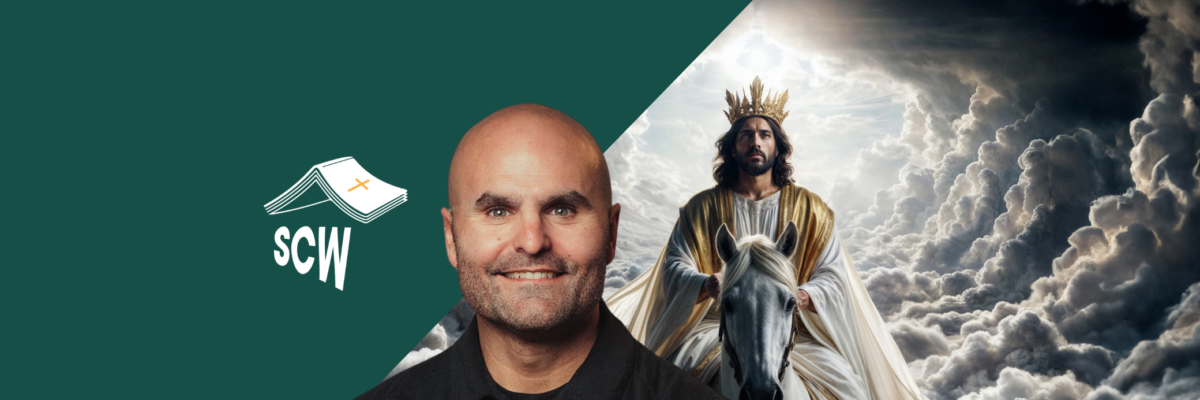
Episode 105: Year B – The Solemnity of Our Lord Jesus Christ, King of the Universe
In this episode, we focus on the readings for the last Sunday of Year B, the Solemnity of Our Lord Jesus Christ, King of the Universe. The details that are relevant to apologetical discussions come from the first and second readings—Daniel 7:13-14 and Revelation 1:5-8 respectively. The topics that these details give opportunity to reflect on are Jesus’ Messianic Kingship, which is the theme of the Solemnity, and Jesus’ Divinity.
Readings: Click Here
Looking for Sunday Catholic Word Merchandise? Look no further! Click Here
Hey everyone,
Welcome to The Sunday Catholic Word, a podcast where we reflect on the upcoming Sunday Mass readings and pick out the details that are relevant for explaining and defending our Catholic faith.
I’m Karlo Broussard, staff apologist and speaker for Catholic Answers, and the host for this podcast.
In this episode, we’re going to focus on the readings for the last Sunday of Year B, the Solemnity of Our Lord Jesus Christ, King of the Universe. The details that are relevant to apologetical discussions come from the first and second readings—Daniel 7:13-14 and Revelation 1:5-8 respectively. The topics that these details give opportunity to reflect on are Jesus’ Messianic Kingship, which is the theme of the Solemnity, and Jesus’ Divinity.
Let’s get started with the first reading, again, taken from Daniel 7:13-14.
As the visions during the night continued, I saw
one like a Son of man coming,
on the clouds of heaven;
when he reached the Ancient One
and was presented before him,
the one like a Son of man received dominion, glory, and kingship;
all peoples, nations, and languages serve him.
His dominion is an everlasting dominion
that shall not be taken away,
his kingship shall not be destroyed.
The detail that obviously relates to the Solemnity is the “everlasting dominion/kinship” that this “one like a Son of man” receives. Jesus clearly identifies himself as this “one like a Son of man” throughout his ministry, the most contentious being at his trial in Mark 14:62.
The Church identifies Jesus as this Messianic King in the Gospel passage, taken from John 18:33-37, where Jesus answers Pilate’s question, “Are you the King of the Jews?”, in the affirmative.
So, Jesus’ Messianic Kingship is the key apologetical topic.
However, there’s more to the story than Jesus simply being the messianic king: he’s the divine messianic king.
Hints of his divinity are already present in this first reading. New Testament scholar Brant Pitre makes this argument in his book The Case for Jesus: The Biblical and Historical Evidence for Christ (143-145). Notice, Daniel describes this “one like a Son of man” “coming on the clouds.” According to the Old Testament, this is something only God does, as Jeremiah 4:13 reveals. Jeremiah writes, “13 Behold, he comes up like clouds, his chariots like the whirlwind.”
Notice also that Daniel doesn’t say, “He is a son of man,” but he is “like a son of man.” Dr. Pitre writes, “He appears to be a merely human figure but is in fact a heavenly being” (The Case for Jesus, 144; emphasis in original).
The contemporary Jewish scholar Daniel Boyarin describes this figure as a “second divine figure” (the first being the ancient of days) and “a God who looks like a human being” (The Jewish Gospels: The Story of the Jewish Christ, 32-33).
This seems to be how Caiaphas the high priest understood this figure from Daniel when Jesus identified himself with him at his trial in Mark 14:62. When the high priest asked Jesus, “Are you the Christ,” Jesus answered, “I am; and you will see the Son of man sitting at the right hand of Power, and coming with the clouds of heaven.” Mark tells us that immediately after Jesus said this, the high priest “tore his clothes, and said, ‘Why do we still need witnesses? You have heard his blasphemy” (v.63).
This theme of Jesus’ divinity, and in particular his identity as the divine figure “like a Son of man” in Daniel, becomes explicit in the book of Revelation, a portion of which is the second reading for this upcoming Solemnity, taken from Revelation 1:5-8.
Here’s what we read:
Jesus Christ is the faithful witness,
the firstborn of the dead and ruler of the kings of the earth.
To him who loves us and has freed us from our sins by his blood,
who has made us into a kingdom, priests for his God and Father,
to him be glory and power forever and ever. Amen.
Behold, he is coming amid the clouds,
and every eye will see him,
even those who pierced him.
All the peoples of the earth will lament him.
Yes. Amen.
“I am the Alpha and the Omega, ” says the Lord God,
“the one who is and who was and who is to come, the almighty.”
The kingship of Christ is front and center here, which is pertinent to the Solemnity that we’re celebrating this upcoming Sunday. But the detail that I want to focus on is the phrase, “I am the Alpha and the Omega . . . the one who is and who was and who is to come, the almighty.”
Notice this is said by “the Lord God . . . the almighty.” This is repeated in Revelation 22:13: “Behold, I am coming soon, bringing my recompense, to repay every one for what he has done. I am the Alpha and the Omega, the first and the last, the beginning and the end.”
So, almighty God is the one who is to come in judgment.
But guess what? According to the previous verses, verses 1 and 7, it’s Jesus who is the one to come: “Jesus Christ is the faithful witness . . . Behold, he is coming amid the clouds.”
What’s the conclusion? Jesus is “the Alpha and the Omega, the first and the last, the beginning and the end”—that’s to say, he’s the almighty God.
Notice also that Jesus is “coming amid the clouds.” Recall, we said before that to come with the clouds is a prerogative of God, as Jeremiah reveals in 4:13.
So, Jesus is not merely the Messianic King. He is the divine Messianic King. And insofar as he the divine Messianic King, he is king of the universe, hence the solemnity name: Jesus Christ the King, king of the universe.
The last detail that I want to focus on, coming from the second reading, is the statement, “[He] has made us into a kingdom, priests for his God and Father.”
For some Protestants, this is evidence that there are no ministerial priests in the New Covenant, since the Bible reveals that we’re all priests as believers. Another common text that’s appealed to in support of this claim is 1 Peter 2:5, 9.
I deal with this objection at length in my book Meeting the Protestant Challenge: How to Answer 50 Biblical Objections to Catholic Beliefs. I’m not going to rehearse all the things I say there.
But suffice to say that the affirmation that we’re all priests as believers in Christ doesn’t entail the negation of a ministerial priesthood. For example, the Israelites are said to be a “kingdom of priests” in Exodus 19:6. Yet, we know there also existed a ministerial priesthood to serve that kingdom of priests: Aaron and his sons.
Moreover, given that John and Peter view the Christian people as a royal priesthood, signifying that the Christian people are the New Israel of God, it’s reasonable to think they also viewed there to be a ministerial priesthood to serve this New Israel of God, just like it was for the old Israel of God.
So, not only does the affirmation of Christians being priests disprove a New Covenant ministerial priesthood, it actually provides reasonable evidence for it.
Conclusion
Well, my friends, that brings us not only to the end of this episode of the Sunday Catholic Word, but also to the end of Year B for the Cycle of Sunday readings. The readings for this upcoming Solemnity of Christ the King give us great apologetical material for
- Jesus’ Messiahship, and
- Jesus’ divinity, and
- The New Covenant Ministerial priesthood.
As always, thank you for subscribing to the podcast. And please be sure to tell your friends about it and invite them to subscribe as well at sundaycatholicword.com. You might also want to check out the other great podcasts in our Catholic Answers podcast network: Trent Horn’s The Counsel of Trent, Joe Heschmeyer’s Shameless Popery, and Jimmy Akin’s A Daily Defense, and Tim Staples’ 1-on-1 with Tim, all of which can be found at catholic.com.
One last thing: if you’re interested in getting some cool mugs and stickers with my logo, “Mr. Sunday podcast,” go to shop.catholic.com.
I hope you have a blessed Solemnity of Christ the King. Until next time when we start Year C, God Bless!



